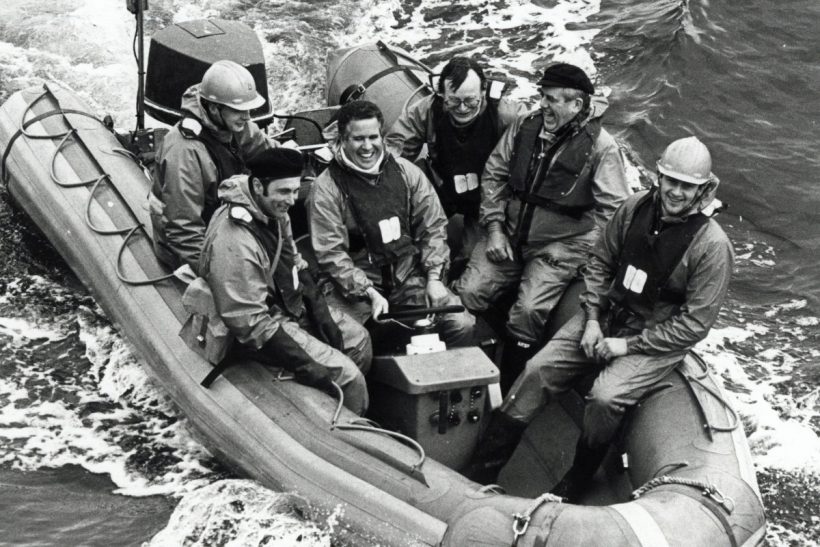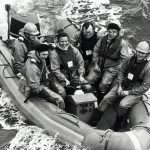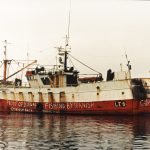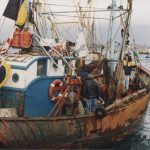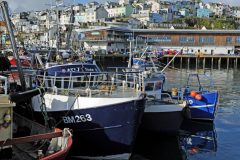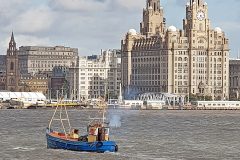Thirty years ago, on 1 October, 1989, fishery protection officer Jim Portus jumped ship from the Ministry of Agriculture, Fisheries and Food (MAFF – now the MMO) to manage the South Western Fish Producers’ Organisation (SWFPO)
He did so after being part of a MAFF ‘strike’ team and seeing his ‘catch’, Jersey skipper Tom ‘Slim’ Bailey, sent to jail until a fine was paid.

The South Western FPO was formed in 1974, becoming the second PO in the UK. Here, Jim studies the original minutes of the first meeting.
“I just couldn’t believe that a so-called crime on issues relating to fish could send a man to jail, and that was enough for me,” said Jim.
However, on handing in his notice, several prosecutions were still in the pipeline, and Jim remained a MAFF prosecution witness – but when high-ranking MAFF lawyers were advised of his new role, Jim’s title was changed from ‘witness’ to ‘hostile witness’. “I quite liked that new title,” he said.
Having risen to the status of captain in his earlier career with the merchant navy stood him in good stead for his future in the complex workings of the fishing industry.
He is a staunch Brexiteer, but ‘although tempted towards the Brexit Party’, Jim Portus remains a member of the Tory party, and he doesn’t hide his warmth towards Britain’s positive future within the fishing industries of Europe. Among other UK/EU duties, Jim helps to maintain the annual Channel Potting Box agreement.
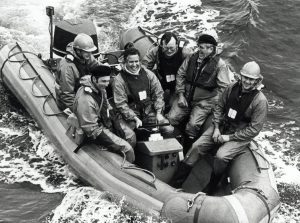
John Selwyn Gummer, fisheries minister from 1989 to 1993, taking part in a boarding from HMS Jersey, which was heading a MAFF strike team to bring British fishermen to heel.
Over the past 30 years, I have had the privilege of witnessing Jim Portus plying his trade as a fishermen’s leader, sometimes on serious issues and at times in lighter moments, and I have many old pictures of such events, so I hope that ‘every picture tells a story’.
Early days
Having left MAFF to fight against its injustices to British fishermen, Jim Portus quickly came to realise how the Common Fisheries Policy (CFP) was ruining the British industry.
He said: “At the time I left MAFF, John Selwyn Gummer MP was the fisheries minister. He had recruited a MAFF ‘army’ – a strike team of fishery protection officers (FPOs).

Jim Portus photographed by Fishing News exactly 30 years ago, just days after he took up his position with the South Western Fish Producers’ Organisation.
“MAFF required more FPOs to implement the CFP. Although the training wasn’t to the level it is today, those officers were specifically trained on issues like fishing vessel licensing. Other FPOs dealt with the day-to-day running of the fishing industry, but there were many geared up to spend more time at sea on fisheries protection.
“I decided to leave MAFF when a magistrate at Torbay Magistrates Court turned around to Jersey skipper Tom ‘Slim’ Bailey, saying that since Slim was a resident in Jersey and not in England, the magistrate had no jurisdiction in Jersey. He refused to let Slim Bailey leave the court, ruling that he must go down to the cells and stay in custody until the fine was paid.
“I had been a witness in that prosecution. When I heard the decision on custody, my face dropped. I saw Slim’s wife Lyn get very upset. I was truly shocked and disgusted at what that magistrate had done. The issue was about fish – it wasn’t anything serious. Surely you can’t jail a man for catching a few too many fish, I thought. But they did. Thankfully, Slim wasn’t in there for long, and the fine was paid in cash.

Jim has run 23 marathons to raise money for the Mission – and awareness of Save Britain’s Fish.
“Fortuitously, before attending the court Lyn had picked up settlings of the trip from the auctioneers – Brixham and Torbay Fish (BTF), predecessor of Brixham Trawler Agents – and had a carrier bag full of money. That’s how many preferred settlings to be made in those days. After paying the fine, Slim and his wife had to go back to BTF and get a sub to pay the crewmen. It was a nightmare, and was enough for me to think seriously about whether I wanted to spend the rest of my life as a fishery officer.
“Shortly after that, Malcolm Cooke of SWFPO came to me and said that they were looking for a manager to take over from the nominal chief executive, Ian Lindley, who had other commitments in BTF and could only work part-time.
“So I took the job. From my days with MAFF, I thought I knew quite a lot about POs, but in truth I didn’t. It was far more complex, but I had a lot of help, and enjoyed the job. I quickly learned to respect fishermen for what they faced each day, making a living from the sea. Of the fishery officers in MAFF, few, if any, knew the hard work that commercial fishing requires. It’s been 30 years of enjoyment to work for SWFPO.”
On joining SWFPO, Jim also began running, and since then has run 23 marathons, over a dozen being the London Marathon. On four of those occasions, he carried a Save Britain’s Fish flag around the entire route.
Jim has a close relationship with the Fishermen’s Mission, saying that it is his ‘charity of choice’. This year alone he has raised over £5,000 for it.
‘Flagships remain a serious problem’
Working within MAFF gave Jim Portus an insight into the growing threat of flag-of-convenience vessels, where the opportunity to trade fishing licences allowed the influx of the Anglo-Spanish fleet.
On joining SWFPO, fighting the injustice of such trading became Jim’s goal. Wanting British tonnage and quotas to go back to true British companies remains his quest.
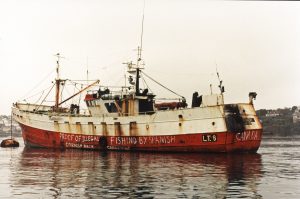
The Blenheim case angered many local people, and even before the court case, protests were daubed over the boat.
Over the 1990s, fishery protection vessels like HMS Jersey, HMS Guernsey, HMS Leeds Castle and others delivered arrested flagships to Falmouth docks on a very regular basis, and taking the opportunity of using the press to highlight what was going on, many times I was there with a camera.
Jim’s feelings came to a head in August 1994, when the owners and skipper of the Anglo-Spanish vessel Blenheim LT 8 were handed down the largest-ever fishing fine of over £400,000. However, little of that was ever paid.
Jim said: “I remember that very well. Owners of the Blenheim refused to pay the fine – however, MAFF had predicted that and had impounded the boat. But the bankers behind Blenheim were one step ahead. Legal action against MAFF had begun, and MAFF had no option but to let the Blenheim leave Falmouth.
“It was another example of how, on signing up to the CFP, the British government made a huge mistake, and fishing licences were allowed to become currency.
“A long time ago, I predicted that by such trading, the loss of British fishing interests and British resources would become huge – well over 50% of the total. It is now significantly greater than 50%.
“Sadly, my prediction came true. British quotas and resources are now spread among owners in Spain, Holland, Norway, Iceland and many more countries. True British interests in the fishing industry are getting less each year.
“Then came the Factortame case, a huge legal wrangle that took over five years to complete, one where several Anglo-Spanish companies won considerable compensation. Flagging out vessel ownership, and the ownership of British quotas moving into foreign hands, are now commonplace. Such trading continues unhindered.
“Even though it continues to try, by losing the Factortame case the British government has surely lost hope of controlling any nationality provisions of British-registered vessels. Vessels above a certain tonnage, whether flagships or not, are considered by this government to be of ‘strategic importance’ to the nation. By law, the master and/or engineer of those vessels must be of British or EU nationality, and have certificates of equivalent competency.
“But what will happen when we leave the EU, when those men have to be British citizens, and those vessels may be forced to have true British skippers and engineers? We already have a shortage of such men. This is even more reason why Britain must ensure proper training facilities for youngsters who are encouraged into the fishing industry.”
Wizard Jim predicts
To press home the fact that severe quota cuts are often not based on solid evidence, Jim Portus became a ‘wizard’, to wave his wand over the unfairness of quotas such as Dover sole in 7e. The prank didn’t make local television, but it did appear in Fishing News!
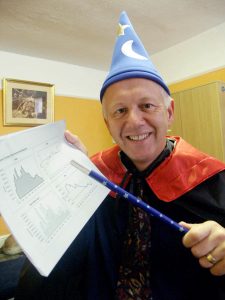
Wizard Jim shows part of his daughter’s dissertation on the under-estimation of the Area 7e Dover sole quota. The work of Joanna and her father resulted in a quota increase of 188% – and the quota has risen ever since.
Quite who thought it up I can’t remember, but I found the wizard’s crystal ball – a goldfish bowl turned upside down – and Jim supplied his own wand and hat!
At that time, the 7e Dover sole quota had been cut by a huge amount as a precautionary TAC – one that South West beam trawler skippers struggled with. “This is the dilemma of any mixed fishery,” said Jim. However, ‘Wizard Jim’ waved his wand, and by both luck and judgement, it worked – and his daughter Joanna made a huge contribution.
He explained: “I was lucky that my daughter was studying marine biology at Plymouth University. For her degree dissertation, Joanna chose to study the Western Channel sole stock, and when she compared the publicly available CEFAS information with private information held by the skippers, the results were shocking.
“Not only did her findings persuade CEFAS and ICES that the 7e sole stock was under-assessed, it triggered a complete turnaround by both CEFAS and ICES, to increase the 7e sole quota by 188% – nearly three times that of the precautionary quota – and the 7e sole quota has grown ever since. It is greater now than it has ever been before.
“Such a remarkable turnaround is confirmation of what dogged determination can do. But by then, the industry had already suffered enough hardship, and considerable decommissioning had taken place. When I left MAFF, there were over 60 beam trawlers that were either registered in Brixham or boats that regularly landed in Brixham. Nowadays, there are about 18 boats, and many spend half of the year scalloping, so it’s not all good news. A lot of damage had been done to the fleet before that quota was improved.
“Looking at the current figures for the entire UK fleet, all trawling tonnage has gone down – demersal, beam trawling and pelagic trawling. The only tonnage that has increased is in scalloping and crabbing.
“Scalloping is now a very important industry to the UK. It’s not just Brexit that has been driving me for the past few years, but that the SWFPO is now the biggest PO that represents scalloping interests in the UK.
“Since 2012, I have been serving on the Scallop Industry Consultation Group (SICG), and presently serve as its chairman. After the landings of mackerel and Nephrops, scalloping is the third biggest sector of the UK fishing industry, and scallops remain a non-quota species. The UK scallop industry needs to get itself on a sustainable footing, and I would like to lead SICG in that goal.”
I asked Wizard Jim whether he’s confident that Brexit will turn over a new page in Britain’s fishing industry. He answered: “Sadly, I don’t see any major changes in the near future. If there is a no-deal Brexit, it will only be a matter of days before the government realises it must get back to the negotiating tables to prevent the chaos that may ensue.
“In the present government, there are MPs who would like to crash out without a deal, but it seems that prime minister Boris Johnson really wants to leave with a deal, one amended from the Theresa May deal.
“The bottom line is that until we have a government that is prepared to repeal legislation from the CFP, I don’t see any huge changes coming. Much of the existing EU legislation will, I fear, be passed over to become British law. To deliver Britain as a separate entity under the United Nations Convention on the Law of the Sea (UNCLOS) – and not be left with a cooked-up version of the CFP – will not be easy. The government must discredit the CFP in total, and not weave parts of the CFP into British law.”
Save Britain’s fish
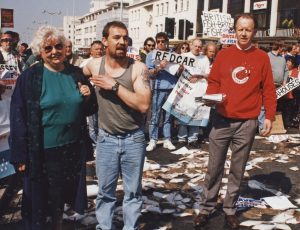
Fishermen from all over Britain came to Plymouth to block off the main street with dead fish. Jim Portus is on the right.
About 20 years ago, Jim Portus sat in his (then) SWFPO office on the Old Barbican, Plymouth, right next door to the MAFF office, where its chief fishery officer Colin George and his staff were quietly at work – but not for long.
A large group of Plymouth fishermen entered the MAFF building to begin a sit-in on behalf of the Save Britain’s Fish campaign. The MAFF staff were sensible, and left. Jim hadn’t been informed; it was an off-the-cuff move to press home that South West fishermen were being forced to dump large quantities of dead fish back into the sea.
By coincidence I was at the Old Barbican, and heard the cries of success from over 20 protestors. I rushed over to find that the MAFF office was cordoned off with red and white tape, the colours of Save Britain’s Fish, and I was allowed in to take a picture.
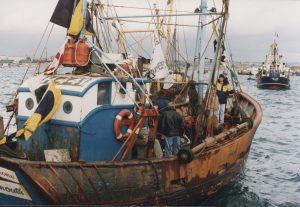
The 1993 Plymouth harbour blockade, in which around 150 fishing vessels were involved. Although each skipper was issued with a summons, none were prosecuted.
Jim explained: “I couldn’t join the sit-in because I knew nothing about it, and to this day I’m disappointed that I didn’t join in. However, my support would certainly have been there. It was a tremendous display of fishermen’s unity in their fight against the CFP.
“I remember that day very well. I was already a staunch supporter of saving Britain’s fish, and the namesake organisation had my full backing. Having campaigned for Save Britain’s Fish with the likes of Tom Hay and John Ashworth, to say that it is rewarding would be an understatement.
“My support for Save Britain’s Fish is because of what I truly believe to be to the benefit of British fishermen. And I am sure that some of my former MAFF colleagues will agree. Not everyone in MAFF was eager to prosecute the fishing industry.
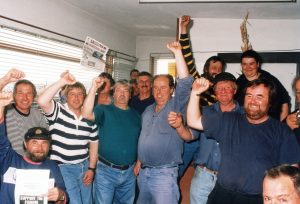
The Plymouth MAFF office sit-in: the office was cordoned off, and few press photographers were allowed in – but an exception was made for Fishing News.
“However, MAFF leaders continued to believe that if fishermen obeyed the law, then eventually a balance would be found and the stocks would become good. But the way that the CFP was written means that such a statement must apply to all fishermen across the EU.
“But we know that British fishermen were under considerably more legislative pressure than fishermen from other countries. And if one looks at the current shares in relative stability – shares of total allowable catch per country – it is clear that some countries turned their backs on legislation for a very long time.
“Those countries have carried on regardless, even buying new or better boats, all with greater efficiency, while we were left behind. It is now time to put that boot on the other foot, as the saying goes.”
Although he missed out on the sit-in, Jim has been involved with many protests, particularly at Plymouth. The Plymouth and neighbouring fishermen have taken protest to many levels, even being a hair’s breadth from the Crown Court for blocking Plymouth harbour and preventing Brittany Ferries from operating. Fishermen from all over the UK often flocked to Plymouth to take part.
Jim added: “One of the best Save Britain’s Fish protests that I took part in was dumping fish in the city centre of Plymouth. Fishermen from all over Britain came – but protests against dumping fish went on long before that, even when I was a MAFF fishery officer. The cod protest, where each fisherman landed just a single box, containing a single cod, was very successful.
“Each fishmarket floor was strewn with hundreds of fish boxes containing a single cod. It was a powerful display of unity, and I wasn’t the only MAFF employee to think, thumbs-up for those fishermen. I think it was 1988, and not one fisherman was prosecuted – and it worked, because the ministry had no option but to do something about it, and not long after, the cod ban was lifted.”



